My friend and fellow author Belinda Pollard recently took the plunge into self-publishing, and she’s here to share her story. Enjoy!
 Last week, I became a self-published author for the first time. An indie. It’s still sinking in that after so many years of yearning to be a novelist, I have a book I can hold in my hand.
Last week, I became a self-published author for the first time. An indie. It’s still sinking in that after so many years of yearning to be a novelist, I have a book I can hold in my hand.
You would think that because of my background, I would have nerves of steel about publishing my own work. I have been editing for traditional publishers for decades, and consulting to authors and self-publishers for many years. I have helped press that Publish button dozens of times. I should be cool as a cucumber — calm and confident.
Well, it hasn’t been that way. The sheer terror of captaining my own ship on this project has taken me by surprise. My respect for others who have taken the plunge before me, already high, has increased a hundredfold.
It’s a little embarrassing for me to confess to all this. I decided to share my story not for your sympathy but in the hope that it might help. If fear is holding you back from venturing into self-publishing, maybe some of the things I’ve learned this year could help you overcome it.
My story
I’d been working on my wilderness thriller Poison Bay for more than fifteen years, and seriously for three. I made the decision at the beginning of this year to publish it myself – a big change of direction for the project.
But my book kept getting sidelined by other more “important” things. I was too busy working on other people’s books, seeing THEIR goals realised instead of my own.
Back in September, I posted an article on my blog encouraging writers to go for their dreams. And with some trepidation, I made the public commitment to self-publish my own debut novel by Christmas.
 An incredibly stressful three months followed, full of sleepless nights and anxiety and run-run-running to get it all done in time. When the proof copy of the paperback finally arrived at my door last week, I posted a (somewhat dishevelled) photo of me with it to Facebook.
An incredibly stressful three months followed, full of sleepless nights and anxiety and run-run-running to get it all done in time. When the proof copy of the paperback finally arrived at my door last week, I posted a (somewhat dishevelled) photo of me with it to Facebook.
I had a conversation with Molly that went something like this:
Me: Did you notice I’m sitting in front of a Van Gogh print? Curiously appropriate given how MAD I’ve gone in the process of this.
Molly: But I see you still have two ears, so it’s not all gone downhill.
Me: The day is not over yet.
Why is it so scary?
I’ve been pondering why publishing my own book should be so terrifying, and I’ve come up with several answers.
- Fiction is so personal. My other writing that has been published over the years has all been non-fiction. Fiction is my imagination on paper, a central part of my being, poured out on paper for all to see. When people reject it, even if I’m just imagining them rejecting it rather than the actual event, it feels like they are rejecting ME. I only grasped this one a couple of weeks ago!
- It’s so hard to know when it’s good enough. In the past, there have been others making the judgement call that my work was ready for the world. Am I at that stage yet? How can I tell? I lost perspective after being buried in it so long.
- It’s all up to me. When I worked for a publishing house in Sydney, there was a team of us all doing our bit to polish the manuscript, design the book, pull the marketing efforts together. We stood as a team. Doing it alone is incredibly hard. It’s my responsibility, and my fault if anything goes wrong.
- There’s SO much to do. Editing, page design, cover design, typesetting, formatting to multiple ebook platform requirements, testing ebooks, proofreading, accounts to be established on all the majors, all of which take different amounts of time and get finicky about different things, two print-on-demand systems to wrangle and endless phone calls and emails to try to get them sorted in time, blog posts, social media updates, guest posts, book signings, and on and on and on. Aagh! I felt like I was wrestling a giant deranged octopus, and I’d get one tentacle subdued but there’d still be seven others belting me over the head or trying to strangle me.
The solution
I can’t say I can now wave a magic wand over those pressures and make them all go away. But by trial and error, I have found some techniques to subdue a few of them. And I will be more intentional about applying these methods upfront for my next indie project.
These are my tips from what I’ve learned. The first two are psychological, the second two are practical.
- Realize you can’t please all of the people all of the time
I can’t stop my fiction being personal and precious to me. But I can be more realistic about how much it should matter, and whether I should let fear of rejection stop me doing something so important to me.
I finally realized there are 7 billion people on this planet, and they don’t ALL have to like my book for it to be worthwhile. Some of them won’t like it, and THAT’S OK. (I’ve put that in caps not to instruct YOU, but for my own benefit. I need to keep reminding myself! 😉 )
Do you know what I’ve realized? Even if there are just a few people that end up appreciating the results of my imagination, that’s still pretty special.
I’ve already had some affirmation through beta readers among the suggestions for improvement.
I’m sure I’ll get some savage reviews – every writer does, even the greats. So when they come, I’ll have to re-read some of the positive comments I’ve received, to help me get balance.
- Realize this is the beginning, not the peak
My motto is to aim for excellence, not perfection, because perfection is impossible. But the trouble with aiming for excellence in writing and publishing a novel is that it’s so hard to know when you’ve reached it.
Trying to figure that out was tying me in knots.
I had a revelation some weeks ago: this is my first novel, not my best novel.
In case you’re getting the wrong idea about that, I don’t mean I haven’t tried my best. This is absolutely the best book I could write at this point in my life.
But I intend to grow and improve as a writer. I see this as a career, not a passing fad. And so I have the opportunity to write better books in the future, if I decide I’m not happy with this one.
My copy of Aldous Huxley’s dystopian sci-fi classic, Brave New World, has this piece in the author’s foreword:
“Its defects as a work of art are considerable; but in order to correct them I should have to rewrite the book – and in the process of rewriting, as an older, other person, I should probably get rid not only of some of the faults of the story, but also of such merits as it originally possessed. And so, resisting the temptation to wallow in artistic remorse, I prefer to leave both well and ill alone and to think about something else.”
Yep, Aldous Huxley had regrets about a book that has been listed among the Top 100 novels of all time.
I’m going to look at Poison Bay in the future and think, “Oh no, why did I write it like that??” But while I can’t hope for the stupendous success of Huxley, I have told my future self to follow his excellent example and “leave both well and ill alone and think about something else.”
You wouldn’t believe how much this has taken the pressure off!
- Make it a team sport after all
As I gathered people around me to help in the task, I felt it relieving some of the tension.
- I used beta readers, lots of them. Each one contributed something different to the polishing of the manuscript. But they also lessened the feeling of isolation. They were in it with me.
- I hired professionals. My editor cost me a lot of money, but she was worth every penny. Not only was the manuscript better for her input, her commitment to the broader goals of my project strengthened me.
- I networked with my writing buddies. I have met some amazing authors and pre-authors on social media – particularly through Twitter and blogging. I asked them for solutions when I ran into problems, and opinions when I wasn’t sure if a section of the manuscript or my book cover or marketing blurb was working, and sometimes just a listening ear while I whined about how hard it all was. 😉 (Any memories of that, Molly??)
- I received encouragement from friends. Several of my friends have been very interested in my book. Talking about it with them has helped to sustain my own energy for the project.
- I was supported by my blog readers. One particularly risky thing I did was to blog about my options for the book cover. (Later, I blogged about trying to make sense of the conflicting feedback!) Not only did this adventure help my eventual cover choices, it also gave me a sense of community. My readers all had different opinions of course, but the bulk of the reactions were so supportive and engaged that it stopped me feeling like a lonely little reed.
We CAN help build that collegiate atmosphere of the publishing house, build a sense of togetherness. “Self” publishing doesn’t have to mean “solo” publishing.
- Don’t try to do it all at once
Here’s a thought for you: Did you know that the book launch process we tend to think is necessary developed mostly from the way publishers warehouse books and booksellers order them?
Warehousing and bookseller orders are irrelevant to most indies who are focusing on ebooks, or ebooks + print on demand. We use mostly online bookstores as an interface between us and our readers. No one has to store inventory; it’s all bytes on a computer somewhere in the cloud. No one goes out of business if we don’t sell 100,000 copies in the first month.
A slow build is absolutely fine for us.
Yes, there are advantages to building buzz for a book from the get go. Yes, high early sales can help trigger Amazon algorithms so that more people see the book and buy it and the algorithms build and build.
But I knew that I didn’t have the resources or the platform or the ENERGY for one of those enormous roll-outs that are staged like a war.
And I knew that many an indie who is now wildly successful started very slowly indeed.
So I decided to opt for a “soft launch”.
Remember the demented giant octopus I mentioned earlier? I found the only way I could live with it in the end was to admit that I wasn’t going to have all the tentacles in a neat row on the one day. I was going to let it align over several weeks.
I didn’t have to try for the magic trick of having my two print versions and my various ebook versions all available in one synchronised moment. I didn’t have to get all my guest posts published on one day – I could roll them out over time. I didn’t have to have a huge launch, or if I did, it didn’t have to be the same day or the same week.
Phew. This is a marathon, not a sprint. And that’s just fine.
My octopus and I are getting along well. It gives my neck a sharp squeeze now and then, and I tickle it under the chin and punch it in the nose. 😉
What are your experiences of self-publishing? If you’ve done it, how did you deal with the nerves? If you haven’t done it, but you’d like to, is it fear that’s holding you back?
 Belinda Pollard is the owner of Small Blue Dog Publishing in Brisbane, Australia. A former journalist, she has been a book editor for 17 years and a publishing consultant for 10, working with trade publishers, independent publishers, and self-publishers. She tweets as @Belinda_Pollard and loves travel, dogs, and strange news stories that trigger fiction ideas. As a writer, she is a published author of meditations and a prize-winner for fiction. She has just self-published her debut thriller, Poison Bay: When the wilderness is not your only enemy, who do you trust?
Belinda Pollard is the owner of Small Blue Dog Publishing in Brisbane, Australia. A former journalist, she has been a book editor for 17 years and a publishing consultant for 10, working with trade publishers, independent publishers, and self-publishers. She tweets as @Belinda_Pollard and loves travel, dogs, and strange news stories that trigger fiction ideas. As a writer, she is a published author of meditations and a prize-winner for fiction. She has just self-published her debut thriller, Poison Bay: When the wilderness is not your only enemy, who do you trust?
Note from Molly: Check out my novels on Amazon, join my Reader’s Club for freebies and book news, and follow me on Twitter. This original content is copyright protected. Thank you so much. Mwah!



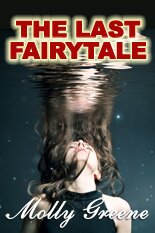
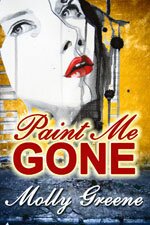

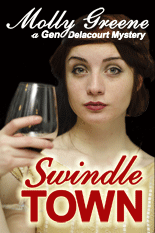

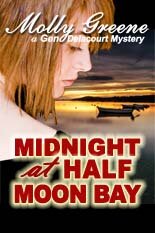
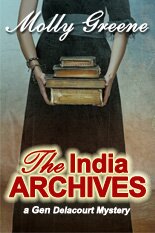

Comments are closed.